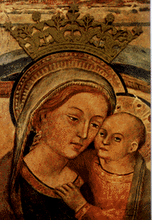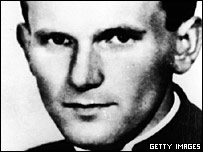
Friday, October 2, 2009
Be not earthly minded - final

Thursday, October 1, 2009
Be not earthly minded IV

Wednesday, September 30, 2009
Be not earthly minded III

Tuesday, September 29, 2009
Be not earthly minded II

Monday, September 28, 2009
Be not earthly minded I
 St. Thomas a Kempis Painting on Mount Agnes by an unknown 17th c. painter
St. Thomas a Kempis Painting on Mount Agnes by an unknown 17th c. painterSource: The Following of Christ by Thomas a Kempis, Book III, chapter LIII. New York, 1925.
Thursday, January 24, 2008
Annihilation of Self VIII
"I may add that this way of annihilation, against which nature cries out so strongly, is not really so painful as we imagine, and it is even sweet. For, first of all, our Lord and Savior Jesus Christ has said so. "Take My yoke upon you," He says, "for it is easy and light." However heavy this yoke may be in itself, God will lighten it to those who willingly take it up, and who consent to bear it for the love of Him. Love does not prevent us from suffering, but it makes us love our sufferings and prefer them to all pleasures."
"The reward, even in this world, of annihilating ourselves, is a peace of heart, a calm in our passions, a cessation of all the agitations of our mind, of all murmurs of interior revolts."
"Let us examine the proof of this in detail. What is the greatest evil of suffering? It is not the suffering itself, but it is our rebellion against it, it is the state of interior revolt which so often accompanies it. A soul that is perfectly annihilated will suffer all the evils imaginable without losing the sweet repose of its blessed state: this is a matter of experience. It costs a great deal to attain to this state of annihilation, we must make the greatest efforts over ourselves; but when we have once attained it we enjoy a peace and repose proportionate to the victories we have gained. The habit of renouncing ourselves and of dying to ourselves becomes every day more and more easy, and we are astonished at last to find that what seemed to us once intolerable, what so frightened our imaginations, raised up our passions, and put our whole nature in rebellion, does not even give us the least pain after a certain time."
Sunday, January 20, 2008
Self Annihilation VII

Tuesday, January 15, 2008
Self Annihilation VI
 Scrooge meeting the Ghost of Christmas Past - an appropriate image of annihilation.
Scrooge meeting the Ghost of Christmas Past - an appropriate image of annihilation."As to what concerns men, I agree that of themselves they have no authority over us, and that any contempt or humiliation or outrage on their part is an injustice. But we have not any the more for that the right to complain of this injustice, because in reality it is not an injustice against us, who are nothing, and to whom nothing is due; but it is an injustice against God, Whose commands they violate when they despise us, or humble us, or outrage us. It is therefore God who should resent the injury they to to Him by ill-treating us; it is not for us to resent it, for in all that happens to us we ought only to feel the injury that is done to God.
My neighbor despises me; he is wrong, because he is of no more importance than I am, and God has forbidden him to despise me. But is he wrong because I am really worthy of esteem, and because there is nothing in me that deserves contempt? No. If he takes away from me my goods, if he blackens my reputation, if he attempts my life, he is guilty, and very guilty, towards God; but is he so towards me? Am I justified in wishing him ill for it, or in seeking revenge? No. Because all that I possess, all that I am, is not properly mine, who have nothing of my own but nothingness, and from whom therefore nothing can be taken away."
~Manual for Interior Souls by Fr. Grou. 3rd Ed. St. Anselm's Society, London. 1905.
Is that not some of the most politically incorrect words you've ever heard? This is simply the antithesis of our "self-esteem", "accolade seeking" culture. Let us strive to live in simple humility and acknowledge God's power over all and our own nothingness. Amen+
Monday, January 14, 2008
Self Annihilation V
"What does God ask of us, when He commands us to annilhilate ourselves and to renounce ourselves? He asks of us to do ourselves justice, to put ourselves in our proper place and to acknowledge ourselves otherwise for what we really are. Even if we had been born and had always lived in a state of innocence, even if we had never lost original grace, we should still be nothing else but utter nothingness from our very nature; we could not look upon ourselves otherwise without making a great mistake; and we should be unjust if we expected God or men to look upon us in any other light. What rights can a thing have that is nothing? What can a thing require that is nothing? If his very existence is a free gift, certainly everything else he has is much more so. It is then a formal injustice on our part to refuse to be treated, or to refuse to treat ourselves, as if we were really nothing.....if we could mould our conduct upon this {avowal of nothingness} and allow God to exersise over us all the rights which belong to Him; if we freely consent that He shall dispose of us as He pleases, of our mind, our heart, and our whole being, it will cost us a great deal, and we shall even find a difficulty in not saying that it is injustice. Therefore, God has pity on our weakness; He does not make use of His rights in all their severity, and He never puts us to certain annilhilating trails without first having obtained our free consent."
~Manual for Interior Souls by Fr. Grou. 3rd Ed. St. Anselm's Society, London. 1905.
It seems to me that annihilation of self is a sort of "super truth", the height, or a rather advanced humility. We acknowledge ourselves before God and our fellow man to be nothing. One prayer I try to offer frequently goes something like this: "God, give me to know now and always that I am nothing, truly the least of all" When prayed in the spirit of love of God and wishing to know Him and serve Him, I have found this prayer to be one of the most satisfying. I often find my soul granted some degree of consolation from this prayer. God lowers Himself down to the soul who abases herself before Him who is Almighty.
Sunday, January 13, 2008
Self Annihilation IV

Thursday, September 20, 2007
Queen Isabella of England ~ et Famille
Great Book

























01.jpg)




























